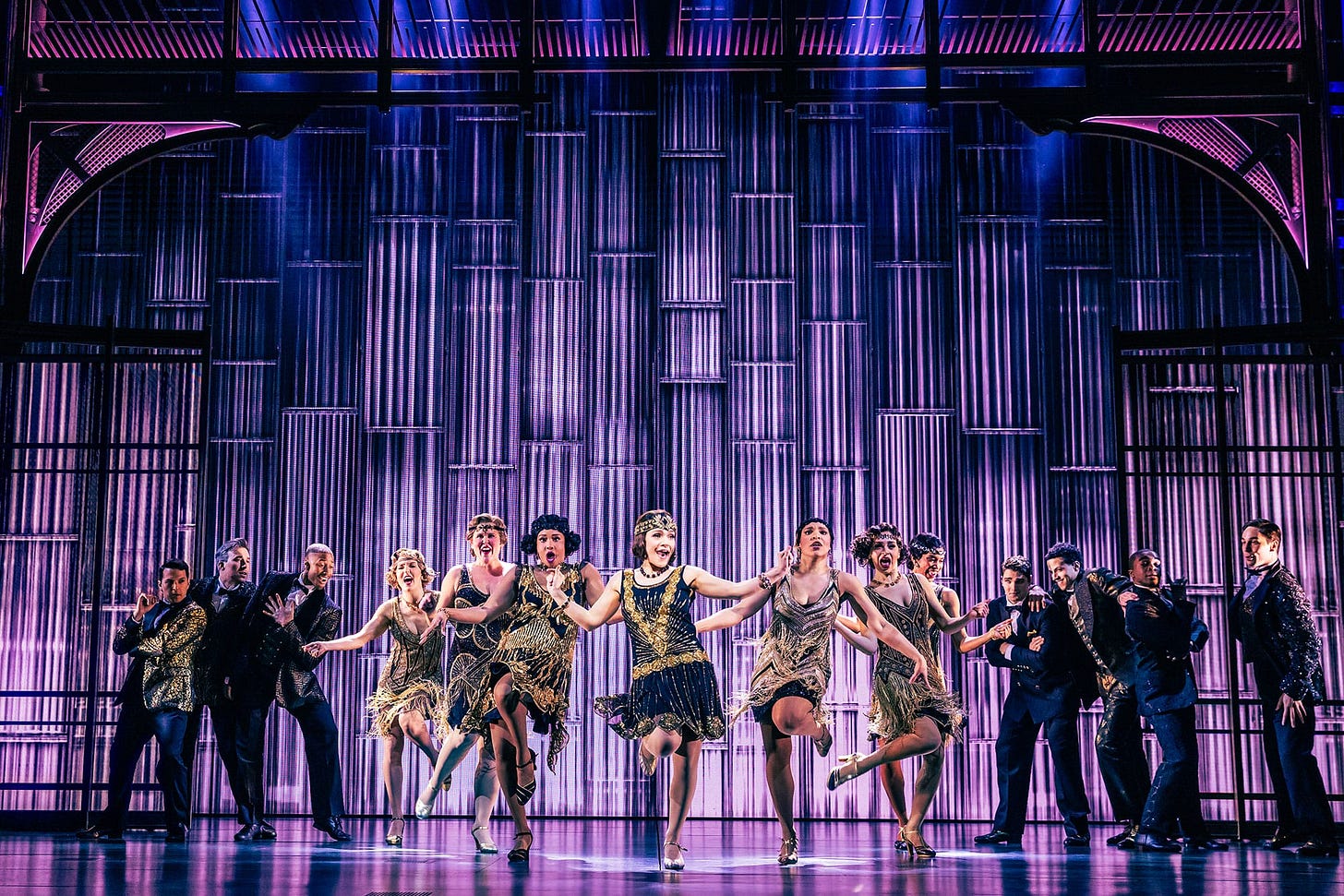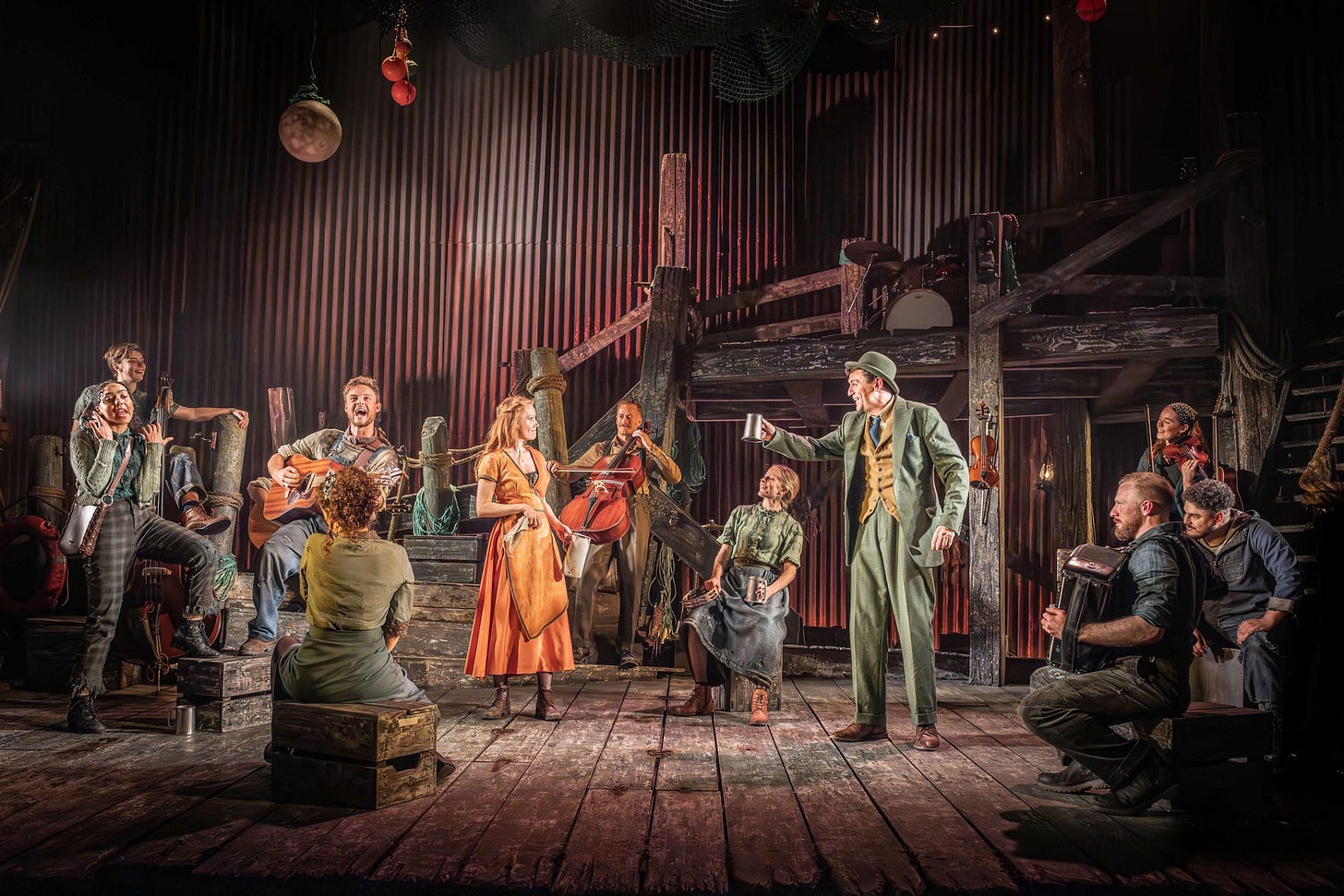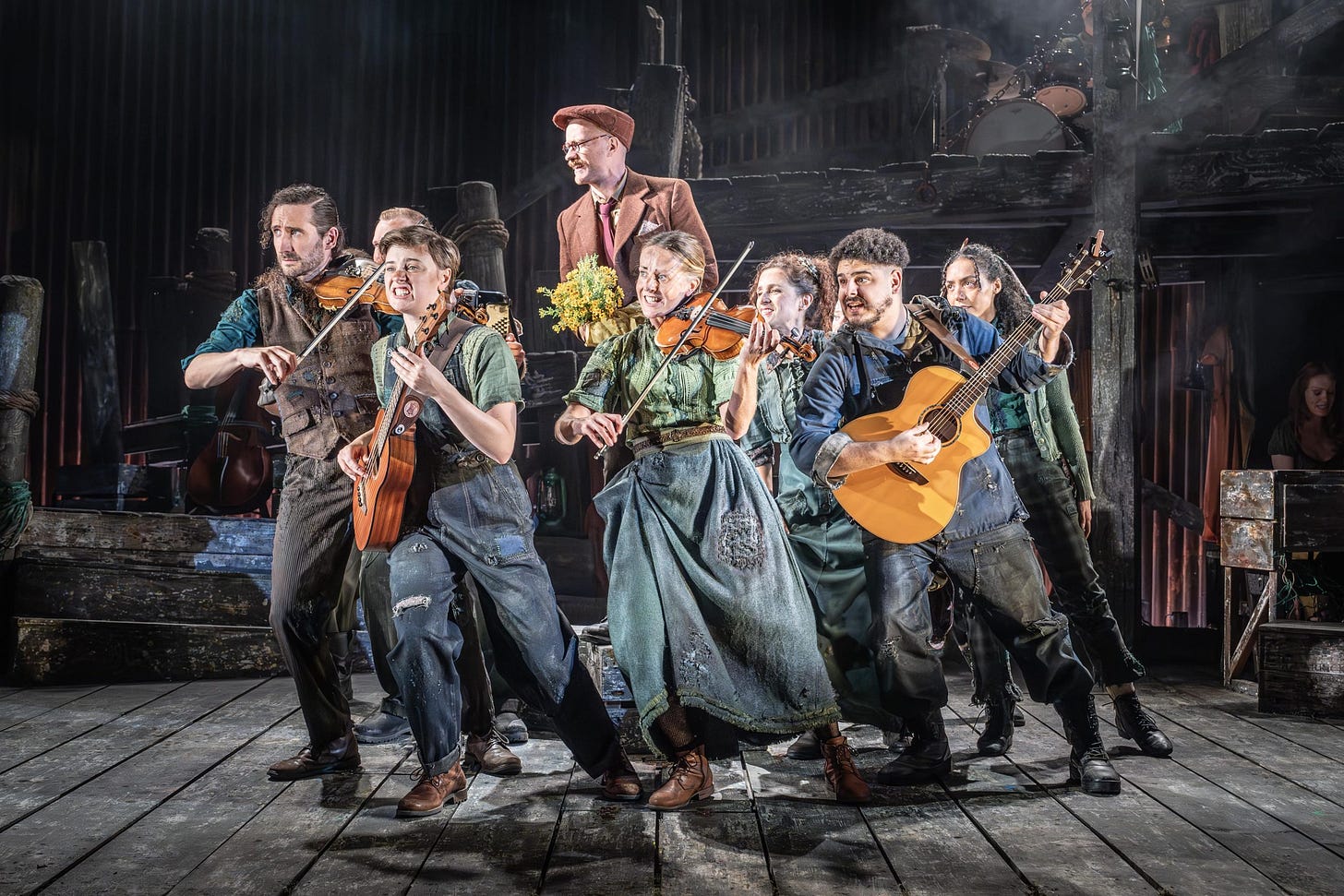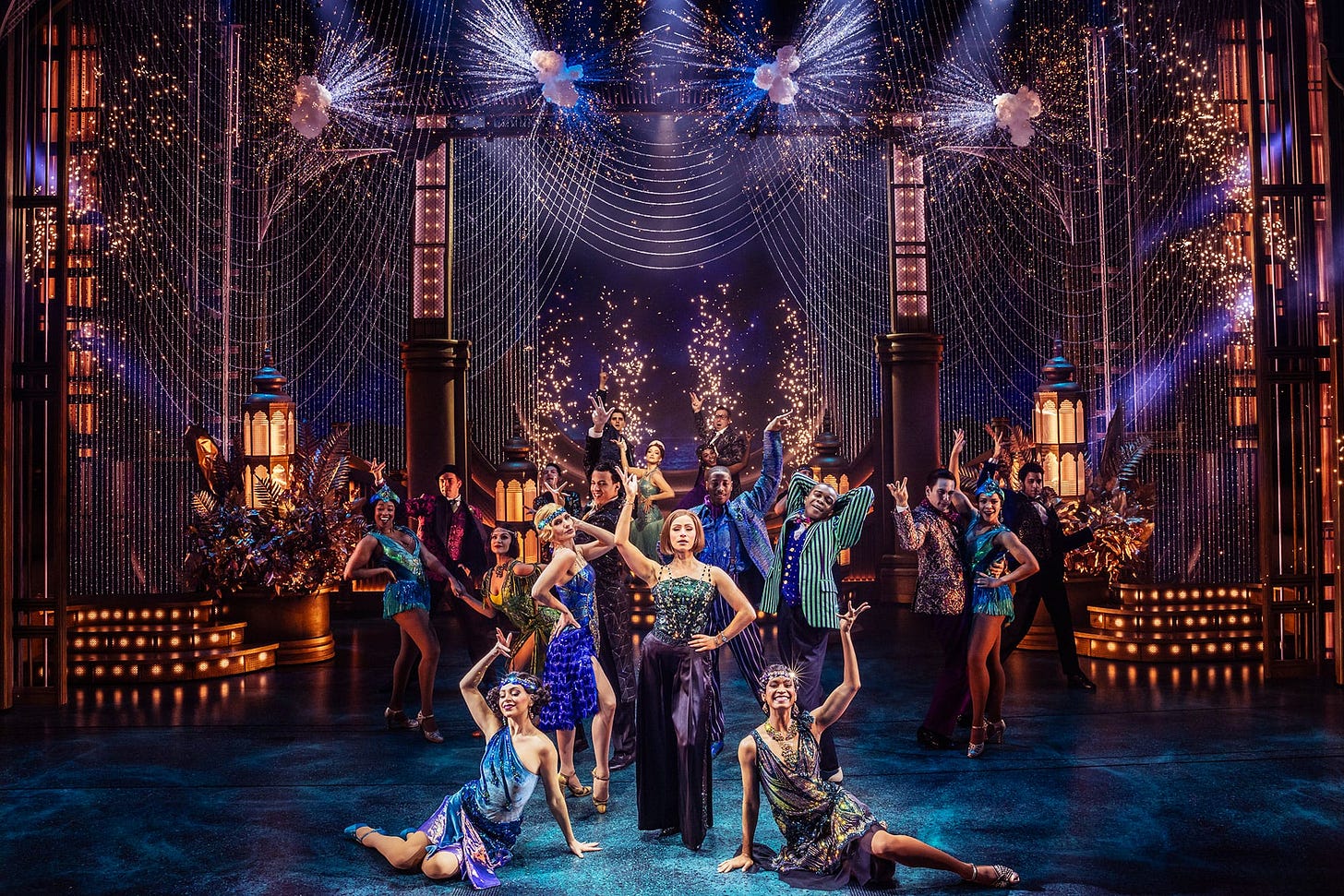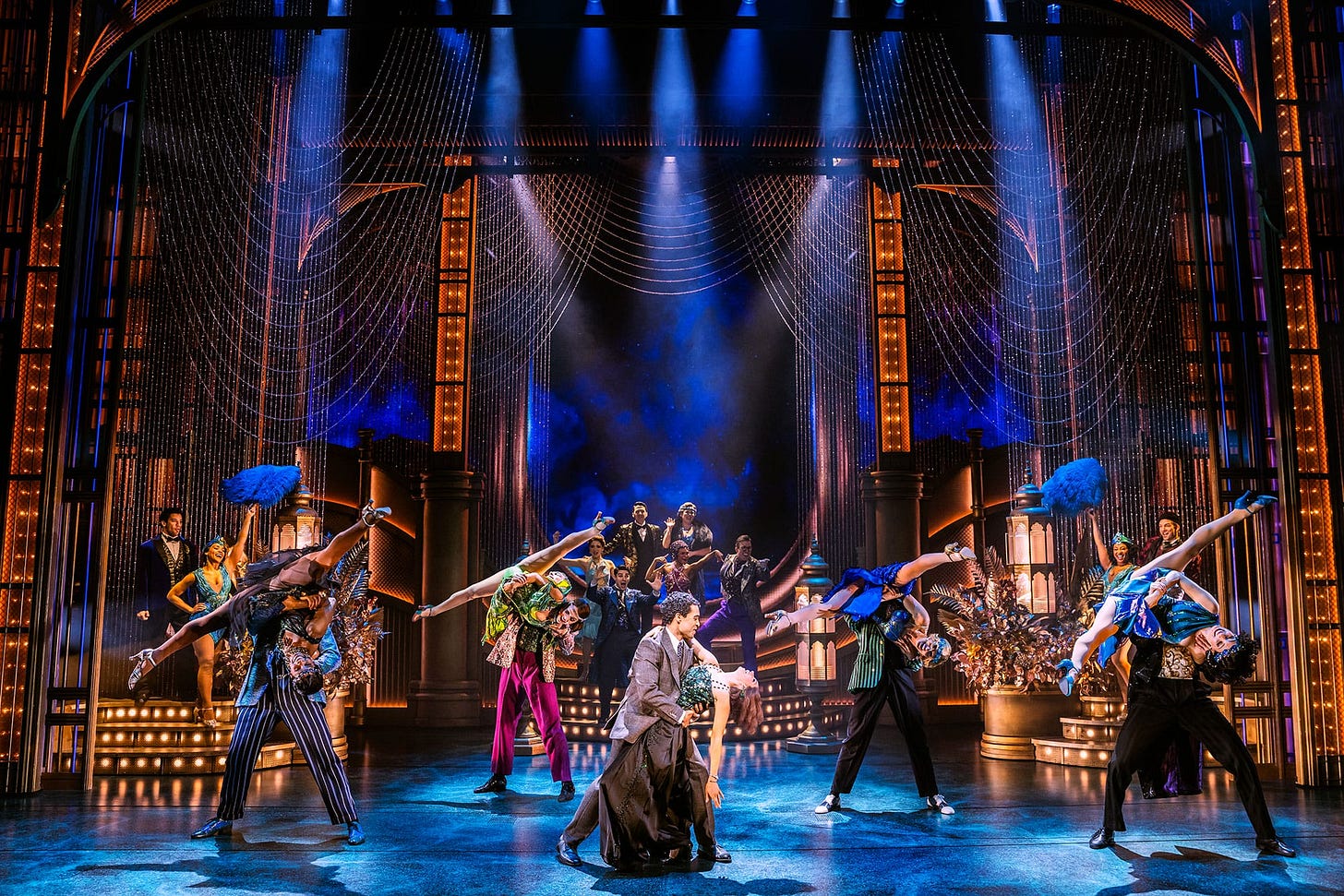What the curious case of two Fitzgerald musicals tells us
Can The Great Gatsby and Benjamin Button shed light on what makes a page-to-stage adaption fly or flop?
By Miriam Sallon
It’s nothing new to take a much beloved book or film and bring it to the stage. And while I have, on occasion, suspected that the idea of an adaptation or reboot has been almost entirely prompted by a financially-driven meanness, aiming to exhaust as little creative energy as possible for as much gain as possible, there are also plenty of examples of remakes or adaptations which I’d consider the quintessential version: Alan Menken’s Little Shop of Horrors, Lisa Kron’s Fun Home, Matthew Bourne’s The Red Shoes.
That being said, it does feel like we’re at peak musical adaptation currently: Pretty Woman, Clueless, Mean Girls, Back to the Future, The Devil Wears Prada, Moulin Rouge, 50 First Dates, Legally Blonde... The list goes on. But why, reader, are there currently two F. Scott Fitzgerald adaptations on the West End? And why are they both musicals? The Great Gatsby is currently in residence at the palatial London Coliseum, and The Curious Case of Benjamin Button is at the Ambassadors. I went to watch both shows in quick succession, to try to make sense of it.
The former tells the story of the mysterious Jay Gatsby, and his long-lost love Daisy Buchanan. Set during the 1920s, the original text is arguably the defining novel of the Jazz Age, luring the reader in with all the pleasure-seeking luxuries of the era, only to pull back the curtain and reveal the emptiness of it all. The show, on the other hand, sticks very much with the glamour and less with the gravitas, leaning heavily on sumptuous sets and sequined skirts. It’s no surprise it won a Tony for best costume design.
Since opening in the West End, it’s suffered mostly two- and three-star reviews along with the much talked about The Guardian one star, and Time Out’s starless negative verdict: “a vacuous attempt to bend Fitzgerald’s masterpiece into a by-the-numbers romantic tragedy.” But even a four-star review from The Stage called it a “glitzy romcom”, which I imagine Fitzgerald would have considered an insult.
Where The Great Gatsby came up via commercial means – led by producer Chunsoo Shin from inception to Broadway – Benjamin Button began in fringe theatre, very much guided by writer-director Jethro Compton. While it’s technically based on the short story by the same name, it takes little from the original text except the central idea, that of a man living backwards: at exactly 8:17pm on the 17 December, the clocks inexplicably start ticking anti-clockwise, water works against gravity, and Benjamin Button is born an old man. Rather than 1860’s upper-class America, the musical begins in 1918 in a Cornish fishing village, complete with a cast of endearing oddballs who make up the musical ensemble.
Benjamin Button has become a critical darling, the Financial Times calling it “thoroughly enchanting”, the Daily Express, “joyous and life-affirming", and The Guardian “a vivacious yet touching show”. And it did very nicely at the Olivier Awards, winning Best New Musical and Best Actor in a Musical.
So is there something particular about Fitzgerald’s prose, something in his narrative style, that lends itself to the musical form – or do these two productions instead shed light on some of the other impulses that might be driving all these page-to-stage adaptations?
Fitzgerald might be famous for capturing the spirit of the Jazz Age – but his writing itself is not exactly crying out for the jazz hands treatment. Writer Richard Yates wrote of The Great Gatsby that every line of dialogue “serves to reveal more about the speaker than the speaker might care to have revealed. [Fitzgerald] contrives time and again to catch all his characters, however subtly, in the very act of giving themselves away.” And after all, you can’t subtly give something away in a great belting musical.
So what is it that has drawn two productions to the same author? Unfortunately, it doesn’t seem to be the stories particularly lending themselves to adaptation. Along with the degree of name-recognition thanks to Fitzgerald’s literary reputation, and both having previously been made into Hollywood movies, there’s also the prosaic fact that both works have recently come into the public domain, making them free to adapt in any way one might fancy.
As Benjamin Button writer Jethro Compton casually explained to an audience at a recent Q&A, “I was researching stories that had recently come into the public domain, and looking for something that had a recognisable title that might make selling tickets a little easier.” Putting on an original piece of theatre, particularly a musical, and particularly in London, is not an easy thing to do, so it’s no surprise Compton was looking for a leg up. According to Richard Howle’s break-down of West End costs, a show would need to make an average of £335,000 per week on ticket sales just to break even, and that’s after initial costs have been recouped.
But the truth is, most often that’s not where a show makes its money. For starters, you might get a national or even international tour out of it which, bafflingly, ends up costing substantially less than a Broadway or West End production – the savings on theatre rental alone are significant – and sells much more reliably. But even better than that are licencing fees. In the same interview, Compton admitted “my plan was just to make it, get it on at Southwark Playhouse and then sell the licencing rights to a US company so we could make some passive income.”
And to be honest, you can see that in the Benjamin Button format: it only requires one set, and because the cast are all actor-musicians, the score has to be flexible to allow for absences – a regular occurrence in a cast of 15 – so there are a million different ways you can orchestrate it. It also has a good gender split, and it’s apolitical, so it would be a great one for schools to put on, for example. (Imagine how many schools in the US will be attempting Cornish accents in the coming years!)
This may be slightly depressing to any Benjamin Button fans who imagined it was a singular passion for the story that led to its creation, but it only really accounts for a very small part of the show’s inception. Compton is actually from Cornwall, so before the show’s first run, they rehearsed there for a week in a bowling alley and then invited friends and locals to watch a dress rehearsal, including Compton’s dad. Call me a sucker, but I just don’t think you’d bring a play to its setting and show it to locals, including your dad, if you were only in it for the money.
Another thing you wouldn’t do is write parts for 13 actor-musicians: firstly, that’s a big chunk of revenue, and secondly, if everyone is singing, playing and acting, it makes it an unusually collaborative venture. And you can feel that from the audience, I think: the balletic synchronicity between the performers in ‘Matter of Time’, a song about the butterfly effect, is a little musical in itself, each performer deftly passing the baton from one to the next as they gather round each other in support. I also don’t think you can fake that level of wholesome enthusiasm seen on stage; cast member Philippa Hogg told The Guardian that before every show they huddle together and dedicate the performance to “someone or something they have experienced that makes them think of the show”.
And ultimately, it doesn’t really matter how it came to be – the fact is, it’s a massive hit. Whereas The Great Gatsby has been dubbed the kind of show “whose soul has been suctioned out in the making.” So what’s the difference here? Why does one succeed where the other flops?
Let’s talk first about what makes a good musical, generally speaking. In most shows, the first act will start by introducing the world and the characters, followed by a ‘call to adventure’, which in turn leads to the hero beginning their journey. Act 2 sees the meat of the journey, leading to plans falling apart, followed by a big climax and a big resolution. It’s simple, and it’s simple for a reason: as I said earlier, subtlety is not for the musical-theatrely inclined.
So how do different kinds of source material fit, or not, with such a well-defined format? Benjamin Button is arguably a neater match, because it demands that an adaptor do something with it: the ridiculousness, and the succinctness, of the plot actually lends itself to becoming a musical. The short story couldn’t be taken clean from the page anyway, because nothing really happens; he learns nothing, and we are taught nothing; it’s simply a little thought experiment, a concept. Which gives Compton and music and lyrics writer Darren Clark total licence to do as they please, and to expand however they want. Benjamin Button has been manipulated further into the genre, with the addition of themes that typically do well in musicals: coming-of-age, star-crossed lovers, small-town folk on a big adventure, and the romantic coastal setting ideally suits the Mumford and Sons-style crescendoing folk score.
And it’s worth noting how far-removed Benjamin Button really is from the original tale. If it had been true to text, it would have been a wildly different show, morally complicated at best and repugnant at worst: while Fitzgerald’s Benjamin does have a great love, in complete contrast to his musical counterpart he falls entirely out of love with her as she grows older: “His wife had ceased to attract him...She was a woman of forty now, with a faint skirmish line of gray hairs in her head. The sight depressed him.” His son finds his backwards aging entirely embarrassing: “his presence was a source of torment”, and there is something disgusting and perverse, rather than endearing or poetic, about both extremes of his condition, being forced to wear baby clothes when he appears as an old man, and nursing on milk when he is actually in his seventies. Better suited to a Martin McDonagh play or an early Tim Burton movie.
The musical, on the other hand, is so wholesome it can at times feel, as The Sunday Times lamented, “like being ambushed by a Christian folk group”. Given the (mostly) rave reviews praising its originality, I was surprised by quite how wide-eyed and chaste it was, assuming for some reason that it would play more with genre expectations. I even brought my musical-sceptic husband who, when the show had a twenty-minute technical pause in the second act, had an arm-grabbing panic when it resumed and they started singing a refrain from the first act (they had not started the play again, it transpired, it was just a narrative throw-back.)
But it’s not the play’s departure from the traditional musical genre that everyone is so excited about. In fact, it’s the complete opposite: it’s that this version of Benjamin Button has been so specifically designed for purpose. The Great Gatsby on the other hand…
Regardless of whether it suits the musical form, this production has clung desperately and awkwardly to the original text, while also having to truncate it. After Jordan says, “Gatsby? I’ve never met him. He’s a complete mystery”, about a minute later, Nick meets him. Mystery solved. Elsewhere, book writer Kait Kerrigan has lifted directly from Fitzgerald’s dialogue: Daisy famously exclaims, “They’re such beautiful shirts. It makes me sad because I’ve never seen such beautiful shirts before.” She’s just reunited with Gatsby after five years, and, overwhelmed and unable to properly express herself, she cries over shirts. But in the show, this is slipped into the middle of a big expressive number – “I thought you’d disappeared, thought you were gone, buried you in my heart” and so on – which renders the original line’s subtext totally meaningless.
This happens repeatedly: another of Daisy’s famous lines, “the best thing a girl can be in this world is a beautiful little fool” is used as the main refrain for another belting number, repeated over and over again, presumably in the hope that you’ll forget how weird it sounded the first time and start to sing along. These bits of borrowed text are then spliced with bizarrely anachronistic lyrics like “Everybody is a tiny bit shady/ It's fine, it’s no big deal” sung on repeat, with a chorus dressed in trenches and fedoras, whipping their coats like Batman capes. This is possibly the show’s most ridiculous moment, but it’s followed closely by Gatsby’s ‘Only Tea’ in which he has a panic attack about the “tiny finger sandwiches”.
Ironically, moments where the writers have felt freer to play about with the story make me wonder if the show might have been great if they’d just left the text entirely. Sure, take inspiration, but leave the serious longing, the literary weight. Call it Gatzby Baby, or Gatsby’s The Greatest, and make it a big glittery bonanza. After all, a surface-level, cocktails-n-flappers (mis)conception of The Great Gatsby already thrives in the popular imagination, thanks to other subtlety-free adaptations such as the shiny Baz Luhrman movie, the long-running immersive experience, or even the sumptuous ballet version.
And there is obviously a market for the kind of big-ticket, glitzy good time that the show almost offers. While the newspaper reviews panned The Great Gatsby from nearly every angle, they’re selling tickets. Filling a venue like the Coliseum, with a capacity of over 2000, is no small feat. As I write this, the coming weekend’s shows all have a few hundred seats left to fill according to the seating chart, but that still leaves well over 1000 sold for each performance. And it’s not the only musical currently on that’s defied the reviews: The Devil Wears Prada suffered similar twos and threes and has just been extended again. And Moulin Rouge, another of the same fate, has now been running for three years.
But for all that The Great Gatsby has been panned, it has also bagged a US tour, commencing in January. Clearly the producers have the proof they need that the name The Great Gatsby will shift tickets. Writing in The Observer recently, Róisín Lanigan suggested that reboots are recession indicators: “Why invest in new ideas, new artistic endeavours, when you can just rehash the past?” Reboots and remakes are “cheaper at least”, she claims. While that can’t be entirely true in this case, with The Great Gatsby estimated to have cost around $25 million to stage on Broadway, it’s fair to say that when money is tight, audiences feel more inclined to spend it on a sure thing. The Great Gatsby is clearly selling on recognition rather than reviews.
But while that may have been the thinking behind both of these productions, the Benjamin Button team have cottoned on to the fact that although audiences might need some gentle encouragement, there is actually a market for originality. See also: Oh, Mary!, an original musical about Mary Todd Lincoln as a drunken cabaret dancer, which only cost $4.5 million to run on Broadway (pennies apparently); SIX, which started at the Edinburgh Fringe, now on in the West End and Broadway, and all over the world; Operation Mincemeat, another original fringe show that has extended for the fifteenth time on the West End and just cracked Broadway.
If audiences are going to be borne back ceaselessly into the past, fed endless adaptations of old stories with new songs, they need to be offered bolder and braver retellings. The main difference between these productions, ultimately, is that The Great Gatsby team were afraid to give audiences something unexpected, and the Benjamin Button team were counting on it.
The Great Gatsby is at the London Coliseum to 7 September; The Curious Case of Benjamin Button is at Ambassadors Theatre, London to 10 October





